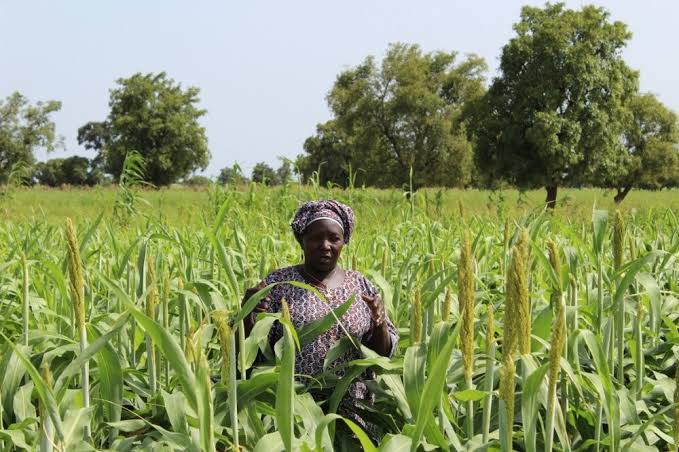The Federal Government says it is collaborating with the African Development Bank (AfDB) to promote and develop Special Agro-Industrial Processing Zones (SAPZS) across the country.
SEE ALSO: Lagos Govt. acquires 84 hectares of land in Osogbo to boost food production
The Minister of State for Agriculture and Rural Development, Alhaji Mustapha Shehuri, announced this in a statement issued on Thursday in Abuja.
Shehuri said in the made available at the Ecobank Agribusiness Summit on Thursday in Lagos that the measure would enable both local and foreign partners to advance the level of trade and investments in the agricultural sector as a veritable strategy to diversify the economy.
The theme of the summit was ‘’ Unlocking productivity and investment opportunities across Nigeria’s agribusiness value chain’’.
Shehuri noted that there was the need for a viable synergy and collaboration of all relevant stakeholders including the financial sector as well as governments at various levels and the development partners.
He further said: ‘’Within the overall set of policy principles, the federal government is concentrating on providing an enabling environment and a level playground for stakeholders at all levels to enhance investment and capital flow into the sector.”
The minister noted that the summit also marked another milestone in the journey of economic diversification in line with the vision of the Economic Recovering and Growth Plan (ERGP) of the present administration of President Muhammadu Buhari.
According to him, the strategy will boost agricultural production, food security, promote innovative technologies and investment in the agricultural sector in order to achieve poverty reduction and job creation, especially for our aspiring youths.
He emphasised that Nigeria’s potentials and prospects made the agricultural sector a pivot for economic stabilisation, diversification and growth in the country.
Shehuri added that the sector was a major contributor to national Gross Domestic Product contribution (GDP) of about 27 per cent and the biggest in job creation in non-oil sectors.
‘’It is gladdening that this forum has brought together, smallholder farmers, input dealers, agro-processors, development finance agencies, policy makers and captains of industry under one roof to discuss the problems and challenges facing the agricultural sector with a view to finding solutions and way forward.
‘’The ministry of agriculture and rural development, is presently providing vivid commitment to creating jobs through the on-going review of agricultural policy, focusing on technology and innovation for agricultural mechanisation.
“Also, by strengthening research and development, training and funding of extension services, in addition to livestock and dairy development,’’ Mustapha noted.
The minister stressed that with the noticeable growth in production in the agricultural sector of the economy, a major emphasis has been on stimulating agricultural export to increase our foreign exchange earnings.
“In doing this, we are giving attention to meeting the standard of the requirements of not only the local but also international markets.
“The agricultural sector will support more farmers by providing the required raw materials for the development of the Agro-Allied Industries in the country,’’ he added.
The CEO Ecobank Nigeria, Mr Patrick Akinmuntan, said the immediate focus was to invest N70 billion in agriculture financing within the next three years.
He said the initial take off tranche of N15 billion dedication funding in association with credible financing partners and instruments had been earmarked for release.
Akinmuntan described agriculture as pivotal to the success and development of any nation.
“We are therefore committed to working with our notable partners to open up vast opportunities that abound in the agriculture sector.
“We will leverage on the successful templates generated in the commodities and agribusiness sectors in the economies that we have supported across the continent, so we can replicate same in Nigeria.
“We are working primarily to create value for all players in the agribusiness value chain, therefore, innovative tools, techniques and methodologies are being created and strategic partnerships are being established to ease agricultural development,” he said.
Mr Aliyu Abdulhameed, the Managing Director, Nigeria Incentive Based Risk System for Agricultural Lending (NIRSAL), said that investors were in agribusiness primarily to make profit, adding that current local and global trend is to invest in the agric sector.
He however emphasised that to maximise its potential, the country’s agriculture sector required businesses in areas like finance capital and technology capital, among others.



Leave a Reply